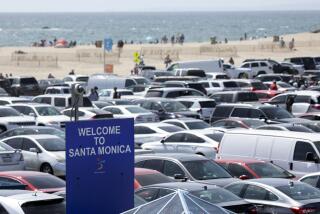Cashing Out Employer-Paid Parking : Commuting: Give subsidy equivalents to employees who pool or use public transit and reduce traffic and pollution.
- Share via
In the struggle to restore freeways and get commuters back on schedule after January’s devastating quake, one aspect of the problem has received little attention: parking subsidies that many firms generously grant to employees.
Employer-paid parking is an invitation to drive to work alone. For example, in downtown Los Angeles the average commuter parking subsidy is almost 50% more than the total cost of gasoline for the average commute trip. If employers offered free gasoline for all employees who drive to work, everyone would recognize this as an environmental outrage--yet employer-paid parking is a much stronger incentive to drive to work.
A law enacted last year in California to deal with the added traffic congestion and air pollution caused by employer-paid parking should give many commuters a sensible new choice--the option to take cash in lieu of free parking.
The law requires employers who subsidize parking to offer employees the option of taking the market value of the subsidy in cash if they don’t take the parking space. An employer who offers to pay for an employee’s parking must now also offer to pay the same amount if the employee does not take the parking.
The law requires the cash option only if the employer pays out-of-pocket cash to a third party to lease spaces for employee parking. The employer’s avoided parking subsidy directly funds the employee’s cash allowance, so there is no net cost increase for the employer when an employee forgoes parking and takes cash (firms with fewer than 50 employees are exempt).
The cash option would most strongly tempt commuters to ride-share to work sites where parking prices are highest. Because parking is usually most expensive in the most congested areas, the cash option automatically targets its strongest incentive to ride-share exactly where this incentive is most needed. And because a commuter can always use the cash to pay for non-transportation expenses, the offer of cash in lieu of parking also rewards the most environmentally benign forms of commuting--walking, cycling and mass transit--as alternatives to driving.
The new legislation helps in rebuilding Los Angeles after the earthquake in another important way. The law requires cities to reduce their minimum parking requirements for developments that offer a parking cash-out program. Using this provision, developers can reduce both the cost of providing the required parking and the resulting traffic impact on the surrounding communities.
Offering commuters cash in lieu of parking subsidies will reduce traffic congestion, improve air quality, conserve gasoline and increase employees’ welfare without increasing employers’ costs. No other transportation program can promise so many benefits for so little cost.
In short, subsidize people, not parking.
More to Read
Sign up for Essential California
The most important California stories and recommendations in your inbox every morning.
You may occasionally receive promotional content from the Los Angeles Times.













